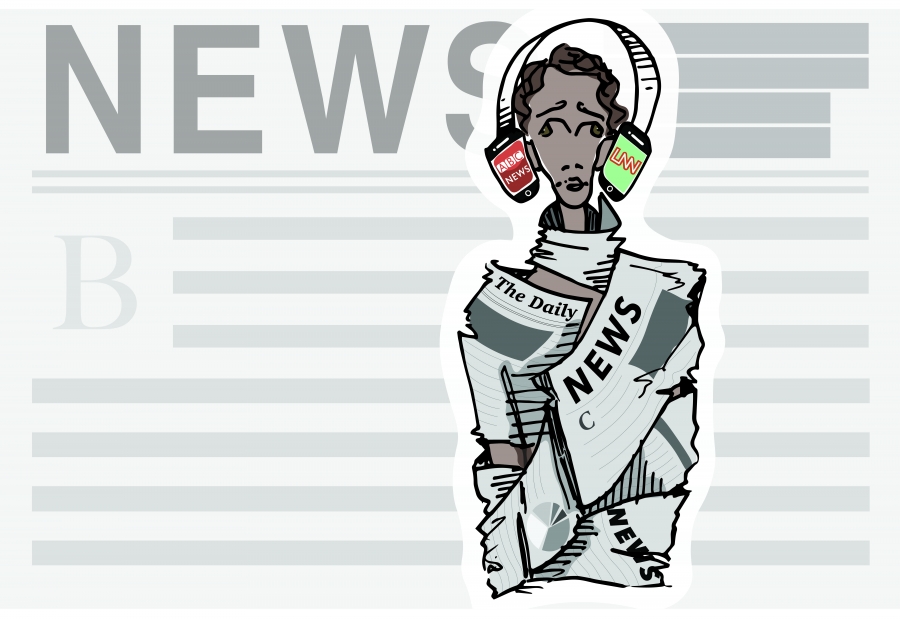
Why tuning out and avoiding the stress of following the news is one of the most lazy, offensive and irresponsible things one can do
 It’s a privilege to live in a country with a free press. Unfortunately, many people take this for granted and instead award themselves the unearned privilege of tuning out.
It’s a privilege to live in a country with a free press. Unfortunately, many people take this for granted and instead award themselves the unearned privilege of tuning out.
There’s a strong tendency to free-ride on other people’s knowledge of current events. Knowing that others actually understand what the hell is going on in the world convinces some that it’s a waste of time to think about topics over which other people have far more influence.
But as members of a free society, we have a responsibility to know as much as possible about national and global events and to broaden our perspectives. The votes and non-political actions of informed people are crucial to changing attitudes on a macroscopic level.
Even with this view, I sympathize with the health arguments for avoiding news. Too much news can cause increased stress and anxiety, which can cause hormone imbalances and physical ailments. However, because of negativity bias, we are predisposed to place greater weight on potentially harmful negative information. If this is a neurological trait that has arisen evolutionarily, we should not work against it. Of course, it’s difficult to convince somebody who is happy and not stressed that they should become more stressed and pessimistic about the world, but the rewards of avoiding harms and injustices far outweigh the stress, time and effort of staying informed in the first place.
So can ignoring the news be considered a proactive time management strategy? No. Everything you see in the news teaches you something or helps you form a new opinion. This is more valuable than a little extra time, and I know that it’ll help my thought process in a future class or job or help me to more fully appreciate a film or book or joke. I can’t think of many other uses of time that accomplish so many positive objectives.
People who aren’t informed often display indifference or inauthenticity that damages the credibility of people who actively work to influence causes that matter to them. I know people who went out of their way to march with protesters on Donald Trump’s election night but have made no effort to keep up since then, asking questions like, “Has he fired Comey yet?” and “What tax bill?” How can somebody feel outraged enough to join a protest without continuing to learn about what supposedly outrages them?
Following the news isn’t hard — it’s everywhere, and it’s one of the best forms of self-education. Refusing to tune in is just lazy. People experiencing horrible circumstances worldwide would be offended by those who think they are lucky enough to not trouble themselves about it. It’s irresponsible to feel so isolated from the world that you only worry about what’s right in front of you. The water crisis in Cape Town, for example, has global implications and may be a harbinger of future events in other locations, so everyone should be reading about it. Everyone needs water.
At a young age, my parents indoctrinated me into the sacred rituals of reading the paper and listening to the radio every morning, and I still make time for news no matter what. It’s important to approach it as something that can enlighten, not just entertain, even with today’s frenetic and self-parodic news cycle. Despite this, I often doubt the merits of my approach and I admit that I’ve become increasingly obsessive.
It’s difficult to define an acceptable bare minimum of what people should be expected to know. How often should you check the news? Is it okay to fall behind? Which important names and stories should you know off the top of your head? What level of cluelessness should permit you to slap your friend in the face?
My personal answers to these questions are stricter than average, and I recognize the problems with that. However, there’s never been a moment when I wished I hadn’t learned something. A friend suggested to me that news consumption is a case of diminishing marginal returns — meaning there’s a point at which you start gaining less proportional utility from each unit of news consumed — which seems logical. I carefully manage my sources and biases and am always amazed by the stimulating content that’s out there, so I don’t believe I’ve reached the point where I’m hurting myself more than helping.
Our current situation with news consumption is analogous to the story of Aron Ralston, author of “Between a Rock and a Hard Place” and the subject of the film “127 Hours.” Our need to stay as informed as possible, despite the toxic political environment, is akin to Ralston needing to continue filtering and drinking his own urine while his arm was trapped by the boulder. This is not ideal, but there’s no choice if we want to stay hydrated and keep democratic ideals alive. Only by doing this can we discover the metaphorical equivalent of amputating our own arm so we can escape this cave.
Written by: Benjamin Porter — bbporter@ucdavis.edu
Disclaimer: The views and opinions expressed by individual columnists belong to the columnists alone and do not necessarily indicate the views and opinions held by The California Aggie.



